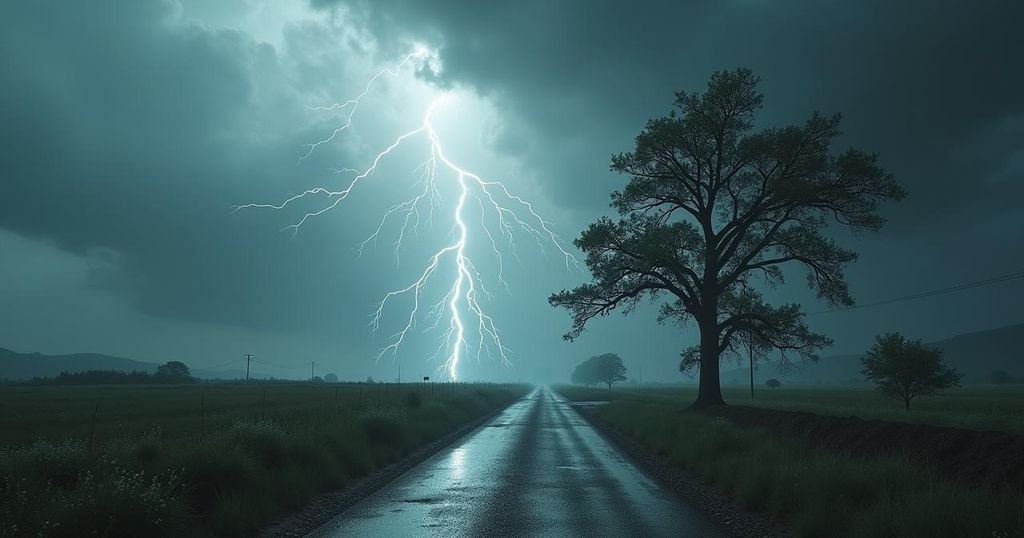Human-Induced Climate Change Intensifies Hurricanes: Implications of Helene and Milton
A study shows that climate change has increased Hurricane Helene’s rainfall by 10% and wind speeds by 11%, with similar impacts expected for Hurricane Milton. The report warns that ongoing fossil fuel use will exacerbate future hurricanes, leading to devastating flooding and destruction. Helene resulted in over 230 deaths and unprecedented rainfall. Scientists stress the urgent need for improved emergency preparedness and climate action to mitigate future risks.
A recent study by World Weather Attribution disclosed that human-induced climate change has increased Hurricane Helene’s rainfall by approximately 10% and intensified its wind speeds by around 11%. This analysis was released as Hurricane Milton intensified while approaching the Florida coast, posing a significant threat to the region. It was determined that the warming climate elevated Helene’s wind speeds by about 13 miles per hour (equivalent to 20.92 kilometers per hour) and contributed to the high sea temperatures that fueled the storm, making them 200 to 500 times more likely than in a pre-industrial climate. The Gulf of Mexico experienced ocean temperatures around 3.6 degrees Fahrenheit (2 degrees Celsius) above the average, which significantly exacerbated the situation. Ben Clarke, a climate researcher from Imperial College London and co-author of the study, commented, “Hurricane Helene and the storms that were happening in the region anyway have all been amplified by the fact that the air is warmer and can hold more moisture, which meant that the rainfall totals — which, even without climate change, would have been incredibly high given the circumstances — were even higher.” The study further advised that Hurricane Milton is likely to experience similar intensification due to existing climate conditions. The researchers emphasized the dire consequences of continued fossil fuel consumption, warning that it will lead to more hurricanes akin to Helene, which brought catastrophic inland flooding rather than solely catastrophic winds. Helene made landfall in Florida with a record storm surge of 15 feet (4.57 meters) and sustained winds of 140 miles per hour (225.31 kilometers per hour), severely impacting Georgia, the Carolinas, Tennessee, and Virginia. The storm led to extensive devastation, leaving millions without power and resulting in over 230 fatalities, making it the deadliest hurricane to strike the mainland United States since Hurricane Katrina in 2005. Meteorologists estimated that Helene unleashed more than 40 trillion gallons of rain in an unprecedented event, with World Weather Attribution stating that the rainfall intensity would have been considerably less without human-induced climate warming. Ben Clarke reiterated the implication of slight increases in rainfall volume, saying, “When you start talking about the volumes involved, when you add even just a few percent on top of that, it makes it even much more destructive.” The frequency of hurricanes as intense as Helene has increased from being expected roughly every 130 years to now being approximately 2.5 times more likely due to climate change. The World Weather Attribution, established in 2015, focuses on assessing the impact of climate change on extreme weather events using rapid attribution studies based on peer-reviewed methodologies. A recent analysis conducted by Lawrence Berkeley National Laboratory scientists corroborated the findings, revealing that climate change has resulted in 50% more rainfall across specific regions in Georgia and the Carolinas and has made such rainfall up to 20 times more likely due to global warming. Kim Cobb, director of the Institute at Brown for Environment and Society, emphasized the uncertainties surrounding specific impacts of climate change on storm intensity. However, she asserted, “we know that it’s increasing the power and devastation of these storms.” She urged that hurricanes like Helene and Milton should serve as urgent reminders for improved emergency preparedness and resilience strategies against the increasing impacts of climate change. The scientific community underscored that future warming trends will exacerbate hurricane statistics, calling attention to the critical need for comprehensive energy policy changes to mitigate prospective hazards. Beyond the immediate threats posed by such storms, Clarke pointed out that, “As we go into the future and our results show this as well, we still have control over what trajectory this goes in as to what risks we face in the future, what costs we pay in the future,” hinging on efforts to reduce fossil fuel reliance.
The article addresses the significant impact of human-induced climate change on the intensity and frequency of hurricanes, particularly Hurricane Helene. It draws on research conducted by the World Weather Attribution, which has utilized weather data and climate models to analyze how climate change has amplified weather events. The information is critical to understanding the broader implications of climate change on extreme weather and highlights the urgent need for policy changes to address ongoing fossil fuel consumption and its repercussions.
In conclusion, the research highlights that human-caused climate change has markedly intensified recent hurricanes, with forecasts indicating that the trend will continue if fossil fuel usage remains uncontrolled. The devastation caused by Hurricane Helene and the impending threat of Hurricane Milton serve as stark reminders of the increasing risks associated with climate change. Scientific assessments emphasize the necessity for immediate action to reduce greenhouse gas emissions and enhance resiliency against future extreme weather events, with proper planning and preparedness being essential to mitigate potential disasters. As the scientific community continues to gather data on this pressing issue, the consensus underscores the importance of addressing climate change vigorously to safeguard communities and ecosystems alike.
Original Source: www.ksnt.com




Post Comment